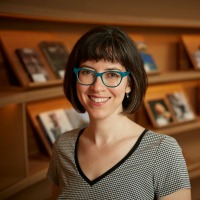
Amy Marshall Furness isthe Rosamond Ivey Special Collections Archivist and Head of Library & Archives at the E.P. Taylor Library & Archives, Art Gallery of Ontario. Amy attended the 2017 DLF Forum as a Kress+DLF Forum Fellow affiliated with ARLIS/NA. Want to attend ARLIS/NA 2018? Anyone affiliated with a DLF member organization may apply–deadline December 11!
Being awarded a cross-pollinator fellowship to the DLF Forum as a member of the Art Libraries Society of North America was well-timed for me, coinciding with a new(ish) job and a renewed commitment to building a digital presence for our collections.
Attending as an ARLIS/NA representative naturally prompted me to reflect on just what I brought to the Forum as an art librarian – in particular, one of the smaller subset of art librarians who work in museum settings which can be very different in scale and programming from university libraries. Is the significant thing about an art librarian their subject knowledge of art? Is there something unique about art libraries as GLAM information settings in which library, archival and image collections can be linked to create research resources that transcend the old silos? I feel that I have lots to bring back to ARLIS/NA from my DLF Forum experience, in terms of new knowledge of best practices and working methodologies. I also found the Forum served as a reminder that subject knowledge isn’t everything – that there is professional wisdom to be gleaned from hearing about diverse topics such as data science, indigenous archives, Wikidata, and open source communities.
Since the Forum I have been thinking about the value of traditional professional associations in the digital era, and the value of moving outside of these to a more work-based or goal-directed association such as the DLF. It can be a challenge to justify paying association membership fees when budgets are tight, so what is the best way to achieve the outcomes we hope for from association membership? The tangible outcomes that can result from the work of DLF working groups are compelling, but what if one’s own institution still feels too small to support participation in this kind of work? I don’t want to think of these memberships as an either/or proposition – I still see great value in belonging to an association of similar institutions and professionals. I think we will have to look seriously at making room for both.
I’ve also been reflecting on national borders. In attending the DLF I felt eager to join a larger conversation – Canada is a much smaller country, population-wise, than the US, and I’m frequently grateful that so much excellent and openly-shared work is happening south of our border. The DLF provides many examples of the kind of outstanding work that can result from reaching across national borders in a generous and collaborative spirit. Still, it would be naïve to imagine that borders do not exist. I thought several times during the conference about differences in information cultures, particularly around privacy and data ownership, and the importance of remaining sensitive to difference when collaborating with people from other cultures.
The idea of the “cross-pollinators” is a great one, and I am grateful to the DLF for developing this program and to the Kress Foundation for their generous support. My own cross-pollination efforts will continue when I attend the ARLIS/NA conference in New York in March.
